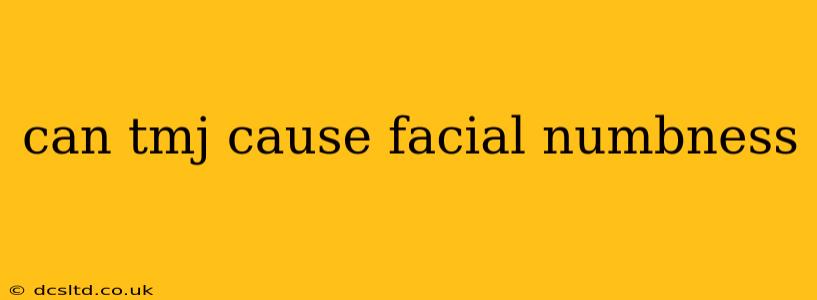Can TMJ Cause Facial Numbness? Understanding the Connection
Temporomandibular joint (TMJ) disorders can be a significant source of discomfort, affecting not only the jaw but also potentially causing symptoms far beyond. One frequently asked question is whether TMJ can lead to facial numbness. The answer is complex, and while TMJ itself doesn't directly cause facial numbness, there's a strong correlation and several potential explanations. This article explores the relationship between TMJ and facial numbness, examining the mechanisms involved and addressing common queries.
How Can TMJ Possibly Relate to Facial Numbness?
Facial numbness is rarely a direct result of TMJ dysfunction. Instead, the connection is often indirect and involves the intricate network of nerves and blood vessels in the face and head. Several factors contribute to the possibility:
-
Nerve Compression: The trigeminal nerve is the primary nerve responsible for sensation in the face. In cases of severe TMJ disorder, the inflamed joint or surrounding muscles might compress branches of this nerve, leading to numbness or tingling in the face, jaw, or teeth. This compression isn't always a direct physical pressure but can be due to inflammation and swelling putting pressure on the nerve pathways.
-
Referred Pain: TMJ pain is notorious for radiating to other areas of the face and head. This referred pain can sometimes manifest as numbness or tingling, mimicking the symptoms of nerve compression. The brain interprets the signals from the affected joint as originating from other areas, confusing the sensation.
-
Muscle Tension: Chronic tension in the jaw muscles associated with TMJ can lead to tension headaches. These headaches can sometimes involve paresthesia (numbness or tingling) in the face, although this isn't a direct effect of the TMJ itself but a consequence of the associated muscle tension and potential nerve involvement.
What Other Symptoms Accompany TMJ Disorders?
While facial numbness can be a symptom, it's crucial to remember that it is not the defining characteristic of TMJ. Other common symptoms include:
- Jaw pain: This is often the most prominent symptom, ranging from mild discomfort to intense pain.
- Clicking or popping in the jaw: This sound is caused by the misalignment of the joint.
- Limited jaw movement: Difficulty opening or closing the mouth fully.
- Headaches: Frequent headaches, often tension headaches, are strongly linked to TMJ disorders.
- Earaches: Pain or discomfort in the ear can occur due to the proximity of the TMJ to the ear.
Can TMJ Cause Numbness in the Lips or Tongue?
Yes, numbness can affect various parts of the face, including the lips and tongue. This is because the branches of the trigeminal nerve innervate these areas. If the nerve is compressed or irritated due to TMJ issues, numbness in these areas is possible.
How is TMJ-Related Facial Numbness Diagnosed?
Diagnosing TMJ-related facial numbness requires a comprehensive evaluation by a healthcare professional, typically a dentist, orthodontist, or oral surgeon specializing in TMJ disorders. The diagnosis usually involves:
- Physical examination: Assessing jaw movement, range of motion, and palpating for tenderness.
- Imaging studies: X-rays, CT scans, or MRI scans can reveal structural abnormalities in the TMJ.
- Neurological examination: To rule out other neurological causes of facial numbness.
What are the Treatment Options?
Treatment for TMJ-related facial numbness focuses on addressing the underlying TMJ disorder. Options may include:
- Conservative treatments: These include pain relievers, muscle relaxants, physical therapy, and stress management techniques.
- Splints or mouthguards: These appliances help to realign the jaw and reduce strain on the joint.
- Injections: Corticosteroid injections can reduce inflammation in the joint.
- Surgery: In severe cases, surgery may be necessary to correct structural problems in the TMJ.
Disclaimer: This information is intended for educational purposes only and should not be considered medical advice. Always consult a healthcare professional for any health concerns or before making any decisions related to your health or treatment. The information provided here does not replace professional medical advice.
